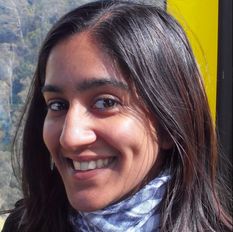Written by Hifzah Tariq, Learning Designer


Recently I had cause to question my own advice when my life as an online Master’s student collided with my professional role as a learning designer.
I’ve been leading the learning design for our MSc in Global Environment and Sustainability with academic colleagues from Birkbeck, University of London. I took pride in following good learning design principles and giving what I believed to be sound advice on creating engaging, effective online programmes. As a Master’s student, I’d reached my research project module and serendipitously had also started working on the learning design for the MSc’s own research module. Now, rather than trying to put myself in the student’s shoes, I found myself well and truly laced into a proverbial pair.
Questioning my own advice
Thinking about what I need as a student really helped me to question the design choices and suggestions I make as a learning designer; were the principles I had learnt beneficial for students, or were they just due process? This opportunity helped me to understand the right questions to ask when designing the module and to appreciate the importance of even the smallest detail.
I saw clearly that there needs to be meaning, purpose and value to the activities and tools we put into our courses, and keeping this in mind throughout the design process is essential. This overlap also helped me to be a better student, as I tried to see the design choices in the module I was studying and their value and purpose.
What my student eyes taught me

Looking at my own learning design practice from a student perspective gave me valuable insight and I’ve now applied this to the design of our MSc Global Environment and Sustainability. Here are three key lessons I’ve learned.
1. Make learning meaningful
Am I really ever going to use this again?! Studying strategy and policy as part of my MSc made me question if I was ever going to use what I was learning; I wasn’t responsible for those sorts of things so maybe it wasn’t relevant to me? But the module made clear how everything connected and offered me many opportunities to research how policies impacted on my own local setting. So the content and design of the module should demonstrate how it can be used both within and beyond the programme of study.
As well as teaching the appropriate skills, it is important to situate content in the world. Can students bring in local context? Can they reflect on historic events and their impact on the research? Can they develop their research to contribute to social change?
Good practice: In the MSc Global Environment and Sustainability, there is a thread that runs from the first module we designed right through to the project module that reminds students to think about their local context, the big picture and what this means for their future plans and careers. Through discussion prompts and short research tasks, we encourage students to apply concepts and ideas to their local or national context and share with peers.
2. Manage expectations but dream big

As a research student, I wanted my own research to have a big impact, to address things that concerned me and to be something I was really proud of. But as I was fitting the course into eight months, while juggling full time work and studying in the evenings, this wasn’t the best option for me.
Lesson: Students should be encouraged to have the ambition and intention for big, positive change, but this must be carefully tempered with what is achievable in the given time frame. But rather than let good ideas fall away, they might instead become a series of blogs, or develop into a PhD, or posted into forums for peer discussion and reflection. A great idea should not be wasted, it just won’t always make it into this particular research project.
The project module for the MSc Global Environment and Sustainability requires students to submit within a set period and this limits the scope of their projects. From the outset we encourage students to consider their research project with a set deadline date and they should prepare their schedule of work with this in mind. But we also encourage students to use ideas that might be too big for this project in other spaces and in their future plans.
3. Ethical research is everyone’s responsibility
The knowledge we produce has impact, however small we think our research projects are. Taking responsibility for what is produced is important. This isn’t just about maintaining academic integrity, but also the ethical impact of our work. Does the research reproduce inequalities? Does it perpetuate stereotypes? Could it be harmful to certain communities? It’s never too early to learn that we must take ownership of what we produce, and this means taking responsibility for the research we undertake and present to the world.
Lesson: The MSc includes carefully selected readings around decolonising research and the responsibility of the writer, with particular focus in the project module on students taking time to reflect on the impact their research will make and ensuring they appreciate the ethical and moral considerations around this.
Twins mage by Gerd Altmann from Pixabay
Glasses photo by Nathan Dumlao on Unsplash
Project board photo by Alvaro Reyes on Unsplash
